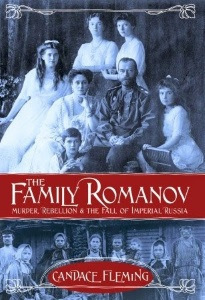7 Questions I Always Ask +1: An Interview with Candace Fleming
I’m psyched to have Candace Fleming on my blog today for my new interview series, “7 Questions I Always Ask, +1.” Candace’s latest book is THE FAMILY ROMANOV, and I’m delighted to share her insights into Russian history, writing historical fiction, a brush with censorship…and more!

Schwartz & Wade, July 2014.
E. Kristin Anderson: What was the first spark of inspiration for your latest book
Candace Fleming: Curiosity sparked THE FAMILY ROMANOV. Mine, as well as that of dozens of middle schoolers. Let me explain. I first read Robert Massie’s Nicholas and Alexandra the summer between my 7th and 8th grade year after pulling it off my mother’s bookshelf.
“You’re not going to like that,” she warned. “It’s pretty dense history.”
She was right. It was dense, but I loved it! Imperial Russia (and its demise) intrigued me. I was hooked! And that sense of curiosity has stuck with me over the years. I’ve read dozens of books on the topic. I’ve watched documentaries and gone to museum exhibits. And I can recite – seriously -whole passages from Dr. Zhivago.
But I’d never considered writing about the Romanovs until five years ago. That’s when students in middle schools – mostly girls — suddenly started asking if I knew anything about Anastasia Romanov. I would visit a school and invariably during the question-and-answer period of my presentation a hand would start waving wildly in the air. No matter than I’d come to talk about people from American history. Time and again I found myself talking about Tsar Nicholas II’s youngest daughter. Why the sudden interest in Anastasia? I finally got the answer from them. They’d seen the animated movie, Anastasia, and they realized it was based on a nugget of truth. But what was that truth? They longed to know. And they hoped I could tell them. Sadly, in the little time allotted, I really couldn’t… not enough anyway. And so I began to conceive of a book for them. THE FAMILY ROMANOV is my answer to those middle schoolers’ questions.
It’s also the answer to mine. Once I decided to write the book, I set out to discover the true story of what happened to Russia’s last imperial family. Sure, I was aware of the facts surrounding their murder. I knew about their bodies’ discovery and the results of DNA testing. But the facts didn’t tell the whole story. I suspected there was more. After some reading and research, I came to realize, more than anything, that I needed to find the answer the question that kept nagging me: How did this happen? How did this rich, splendidly privileged family related by blood or marriage to almost every royal house in Europe end up in that Siberian cellar? Something had gone terribly wrong. But what? What forces were at work? What personalities? And was there really nothing Nicholas and Alexandra could have done to change their fate? These were the questions I set out to answer. But doing so, I realized, required a wider lens. I would need to look beyond the Romanovs and their fairy-tale existence and examine the lives of the lower-class Russians – peasants and workers, revolutionaries and soldiers. The result? A book that weaves three strands. The first is an intimate look at the Romanovs themselves. The second follows the sweep of the revolution from the workers’ strike of 1905 to Lenin’s rise to power. And the third – told in their own words – is the personal stories of the men and women whose struggle for a better life directly affected the course of the Romanov’s life.
It’s a big, big story — compelling, heartbreaking and, at times, downright weird. Imagine this: The Russian royal family is living a fairy-tale existence. The richest man on the planet, Tsar Nicholas II owns one-sixth of the world’s land, thirty palaces, gold and silver mines, five yachts, an endless collection of priceless painting and sculpture, two private trains, countless horses, carriage and cars, and vaults overflowing with precious jewels. The Romanovs have it all! But Nicholas is a man of limited political ability. He’s simply not suited to rule Russia. And his wife, Alexandra, is held spellbound by a charismatic, self-proclaimed holy man named Rasputin. She believes Rasputin can save her hemophiliac son, Alexei, from bleeding to death. Desperate, she will do anything – anything — including handing over the reins of power to the evil monk. Meanwhile, in the palace there also lives four, beautiful grand duchesses – Olga, Tatiana, Marie and Anastasia. But they are kept isolated from the world by their paranoid and overprotective parents. They don’t attend balls or banquets. They don’t have any friends their own age, or suitors, as they grow older. The have only each other. Living in this bubble stunts them emotionally. Even at age twenty, Olga giggles like a schoolgirl and blushes when she sees an onscreen kiss. And with all this craziness going on inside the palace gates, no one is paying any attention to the dark clouds that are gathering outside them. Starving, war-weary Russians are tired of Nicholas and Alexandra’s inept rule. They revolt, and the Romanov’s fairy tales lives come crashing down, leading to ninety days in captivity… a horrific and bloody mass murder… hidden bodies and rumors of escaped princesses. Awesome, right? And every word is true, just as those middle-schoolers demanded.
EKA: If you could get moderately tipsy with any writer living or dead, who would it be?:
CF: I’d love to share a bottle of prosecco with Jane Austen. Maybe, if she got tipsy enough, she’d tell me what happened to Elizabeth and Mr. Darcy after their wedding.
EKA: What was the first book you remember reading and enjoying as a young reader?
CF: It was STUART LITTLE by E.B. White.

Candace Fleming.
EKA: If you could go back and time and tell your teen self ONE THING AND ONE THING ONLY, what would it be?
CF: You’re not fat.
EKA: Have you ever had a book challenged or banned? What was it like?
CF: A few years ago I wrote a biography about Eleanor Roosevelt. Of course, I discussed her rumored lesbianism. This resulted in several school librarians refusing to put it on their shelves for fear of parental complaints. Naturally, when I heard about it I was frustrated. But I didn’t have any personal part in their decision.
EKA: What kind of book do you really want to try to write, but haven’t ever attempted? And what do you think is holding you back?
CF: Someday I’d like to write a novel about my high school experiences. Why haven’t I? I’m just not a good enough writer yet. My ability doesn’t match my ambition. But…maybe someday.
EKA: You’ve written a TON of historical fiction as well as nonfiction. What’s your favorite time period to write about and why?
CF: My favorite time period is always the one I’m currently writing. That’s because it’s the period I think about, and daydream about. It’s the one I’m absorbed in, and imagining back to life. I spend hours each day there. It’s a bit like living with a foot in two worlds.
Thanks, Candace! Your many historical worlds are so inspiring!









